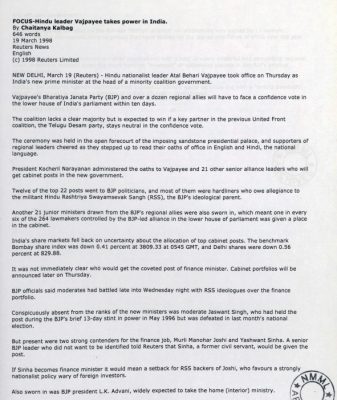Focus- Hindu leader Vajpayee takes power in India
[Reuters]
Published date: 19th March 1998
19 March 1998
Reuters News
English
(c) 1998 Reuters Limited
NEW DELHI, March 19 (Reuters) – Hindu nationalist leader Atal Behari Vajpayee took office on Thursday as India’s new prime minister at the head of a minority coalition government.
Vajpayee’s Bharatiya Janata Party (BJP) and over a dozen regional allies will have to face a confidence vote in the lower house of India’s parliament within ten days.
The coalition lacks a clear majority but is expected to win If a key partner in the previous United Front coalition, the Telugu Desam party, stays neutral in the confidence vote.
The ceremony was held in the open forecourt of the Imposing sandstone presidential palace, and supporters of regional leaders cheered as they stepped up to read their oaths of office in English and Hindi, the national language.
President Kocheril Narayanan administered the oaths to Vajpayee and 21 other senior alliance leaders who will get cabinet posts in the new government.
Twelve of the top 22 posts went to BJP politicians, and most of them were hardliners who owe allegiance to the militant Hindu Rashtriya Swayamsevak Sangh (RSS), the BJP’s ideological parent.
Another 21 junior ministers drawn from the BJP’s regional allies were also sworn In, which meant one in every six of the 264 lawmakers controlled by the BJP-led alliance in the lower house of parliament was given a place In the cabinet.
India’s share markets fell back on uncertainty about the allocation of top cabinet posts. The benchmark Bombay share Index was down 0.41 percent at 3809.33 at 0545 GMT, and Delhi shares were down 0.56 percent at 829.88.
It was not immediately clear who would get the coveted post of finance minister. Cabinet portfolios will be announced later on Thursday.
BJP officials said moderates had battled late into Wednesday night with RSS ideologues over the finance portfolio.
Conspicuously absent from the ranks of the new ministers was moderate Jaswant Singh, who had held the post during the BJP’s brief 13-day stint in power in May 1996 but was defeated in last month’s national election.
But present were two strong contenders for the finance job, Murli Manohar Joshi and Yashwant Sinha. A senior BJP leader who did not want to be Identified told Reuters that Sinha, a former civil servant, would be given the post.
If Sinha becomes finance minister it would mean a setback for RSS backers of Joshi, who favours a strongly nationalist policy wary of foreign investors.
Also sworn in was BJP president L.K. Advani, widely expected to take the home (interior) ministry.
Another inclusion was George Fernandes, whose Samata Party is a key partner in Vajpayee’s coalition. Fernandes, who as industry minister in the late 1970s expelled Coca Cola Co and International Business Machines Corp from India, has already served notice he will take a hard line on multinational corporations.
The pundits were already hard at work listing the huge challenges Vajpayee’s disparate coalition will face.
Vajpayee steps into the prime minister’s post for the second time in 22 months.
Election-weary Indians will look to their new rulers to deliver on their pledge of a “stable, honest, transparent and efficient government”.
A National Agenda unveiled by the BJP-led “saffron alliance” on Wednesday was signed by 17 leaders, underlining the ideologically diverse groups that have jostled for the loaves and fishes of office over the past two weeks.
The National Agenda, hammered out after negotiations with a host of newly powerful and demanding regional allies, drastically watered down the more hardline “swadeshi” or nationalist clauses in the BJP’s original election manifesto.
Instead, the National Agenda reaffirmed that economic reforms would continue but with a “strong Swadeshi thrust” and vowed to solve the problem of India’s 37 million unemployed.






